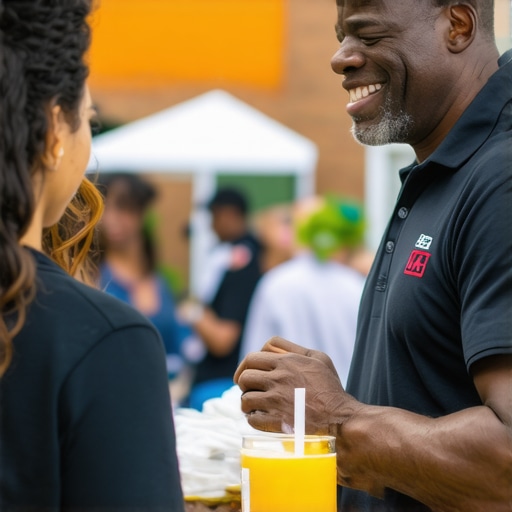How I Discovered the Power of Local SEO for My Business
It all started a few years ago when I realized that merely having a website wasn’t enough to attract local customers. I needed a strategy that made my business stand out in local searches, and that’s when I dove into the world of Google My Business (GMB) and local SEO. My first step was optimizing my GMB profile, which immediately boosted my visibility and brought in more foot traffic.
My Top Strategies to Elevate Your Google My Business & Local SEO Rankings
Through hands-on experience, I learned that consistent NAP (Name, Address, Phone Number) information across all platforms is crucial. I also discovered that gathering genuine reviews not only builds trust but significantly enhances rankings. Incorporating relevant keywords naturally into my GMB description and regularly posting updates kept my profile active and engaging. These tactics, combined with local backlink building, created a powerful local SEO foundation.
What Really Works: Personal Insights on Local Search Optimization
One of the most effective strategies I found was leveraging local keywords in my Google posts and service descriptions. For example, if you’re in a niche market, targeting specific search terms like “best pizza in Brooklyn” or “affordable plumbing services” can make a difference. I also invested time in engaging with customer questions and responding promptly, which improved my profile’s credibility. For a comprehensive guide, I highly recommend checking out authoritative sources like Moz’s local SEO tips.
How Can I Ensure My GMB Profile Stays Ahead of the Competition?
The key is continuous optimization. Regularly updating your profile with fresh photos, posts, and responding to reviews keeps your listing active and relevant. Also, monitoring your local rankings and adjusting your keywords accordingly can help maintain your edge. Remember, local SEO is an ongoing process, not a one-time setup.
If you’re curious about more advanced tactics, explore strategies like GMB boost techniques that can skyrocket your local visibility.
I’d love to hear your experiences with local SEO! Drop a comment below and share how you’ve improved your Google My Business rankings or any challenges you’ve faced.
Why Local Search Optimization Is More Critical Than Ever
As local consumers increasingly rely on search engines to find nearby businesses, mastering local SEO is no longer optional—it’s essential. With Google continuously refining its algorithms, staying ahead requires not just basic GMB optimization but a strategic, nuanced approach that integrates emerging trends and proven tactics.
How Can You Leverage Hyper-Local Keywords for Maximum Impact?
Using hyper-local keywords—specific to neighborhoods, landmarks, or community events—can dramatically improve your visibility. For example, instead of generic terms like “pizza,” target “best gluten-free pizza in Downtown Brooklyn.” Incorporate these keywords naturally into your GMB description, service pages, and Google posts. Regularly analyze your local keyword performance with tools like Google Keyword Planner or SEMrush to refine your strategy and keep pace with competitors.
Visual content enhances user engagement and signals relevancy to search engines. Consider adding high-quality images of your storefront, products, or team members, optimized with relevant alt text. An engaging photo gallery can also boost your local rankings—just ensure images are updated regularly to reflect your latest offerings.
What Are the Hidden Opportunities in Local Link Building?
Beyond traditional backlinks, local link building involves partnerships with community organizations, sponsorships, and guest posting on local blogs. For example, collaborating with local chambers of commerce or sponsoring community events can generate authoritative backlinks and social proof. These activities not only enhance your local SEO but also embed your brand within the community fabric.
How Do Customer Engagement and Reputation Management Influence Rankings?
Active management of reviews and customer interactions is paramount. Responding thoughtfully to reviews, especially negative ones, demonstrates your commitment to customer satisfaction, boosting your profile’s credibility. Additionally, encouraging satisfied clients to leave detailed reviews can create user-generated content that reinforces relevant keywords and service descriptions.
For a comprehensive understanding of how to implement these strategies effectively, I recommend exploring expert insights from Google SEO boost strategies. They delve into actionable tactics that can elevate your local search presence in 2024 and beyond.
Are You Missing Out on Local Voice Search Optimization?
With the rise of voice-activated devices, optimizing for voice search is a game-changer. Use conversational keywords and answer common questions related to your niche, such as “Where can I find affordable plumbing in my neighborhood?” Incorporate these into your GMB posts and FAQ sections. This approach ensures your business remains accessible to the growing segment of voice search users.
If you’d like to share your experiences with local SEO or need tailored advice, drop a comment below. And for those eager to learn more, check out our detailed guides on top Google SEO techniques to stay ahead in the local search game.
Deepening My Understanding: The Nuances of Local SEO in a Competitive Landscape
As I delved further into local SEO, I realized that the landscape is far more intricate than simply optimizing for basic keywords or maintaining consistent NAP information. One of the pivotal lessons I learned was the importance of understanding the unique search intent of your local audience. For instance, when I started analyzing search queries, I noticed a shift towards long-tail, conversational phrases—often in voice search format—which signaled a need to adapt my content strategy accordingly. According to Moz’s latest insights, optimizing for natural language and question-based keywords can significantly improve your local rankings. This required me to rethink my approach, integrating FAQ sections and more natural, conversational content into my GMB posts and website descriptions.
How Do Hyper-Local and Niche-Specific Keywords Transform Visibility?
In my journey, I found that hyper-local keywords—like neighborhood names, landmarks, or community events—are game-changers. They help you target highly specific search queries that your broader competitors might overlook. For example, instead of targeting “plumber,” I focused on “emergency plumbing services near Central Park.” This specificity reduced competition and connected my business more directly with local consumers actively seeking my services. The key was to weave these keywords seamlessly into my content, ensuring they sounded natural and relevant. I also leveraged tools like SEMrush to monitor keyword performance and identify emerging local trends, which kept my content fresh and aligned with user intent.
Visual content plays a vital role in local SEO—especially when it reflects your community and resonates with your audience. Regularly updating high-quality images of your storefront, team, or local events helps build trust and signals to search engines that your profile is active and relevant. Optimizing images with descriptive alt text further enhances visibility, especially in local image searches. I found that engaging visuals not only attract clicks but also encourage customers to share their experiences, creating user-generated content that reinforces your local relevance.
Can Advanced Local Link Building Strategies Sustain Long-Term Growth?
Absolutely. Beyond basic backlinks, I discovered that forming genuine partnerships within your community yields more meaningful and authoritative links. Collaborating with local chambers of commerce, sponsoring neighborhood events, or guest posting on local blogs can create a network of backlinks that boost your authority and embed your brand within the community fabric. These relationships also foster trust and loyalty, which are invaluable for long-term success. I recommend exploring GMB boost strategies that focus on community engagement to amplify these efforts.
How Do Reputation Management and Voice Search Optimization Intersect?
Managing your online reputation is more critical than ever, especially as voice search continues to grow. Responding thoughtfully to reviews, particularly negative ones, demonstrates your commitment to customer satisfaction. Moreover, optimizing for voice search involves integrating natural language and question-based keywords into your FAQ and GMB posts. For instance, including questions like “Where can I find reliable electricians near me?” and providing clear, concise answers can improve your chances of being featured in voice search results. This dual focus on reputation and voice search positions your business to capture a broader segment of local consumers actively seeking your services.
If you’ve experimented with these advanced tactics or faced challenges, I invite you to share your experiences below. For more detailed strategies, check out our comprehensive guide on top Google SEO techniques designed to elevate your local presence in 2024 and beyond.
Unlocking the Nuances of Local Search Patterns for Superior Visibility
As I continued refining my local SEO approach, I uncovered the profound impact of understanding specific search behaviors unique to my community. Deep analysis of search query data revealed a trend toward micro-moments—those real-time, intent-driven searches that happen when consumers need immediate solutions. For instance, during community events or seasonal peaks, search terms shift dynamically. Incorporating these insights into my content strategy involved leveraging tools like Google Search Console to track long-tail, conversational keywords, aligning my content with actual user intent. According to Moz’s recent research, embracing natural language and question-based keywords significantly enhances local ranking potential, especially in voice search and mobile contexts.
How Can Hyper-Local and Niche-Specific Keywords Revolutionize Your Reach?
Focusing on hyper-local keywords transformed my visibility by connecting precisely with community-specific searches. Instead of generic industry terms, I targeted neighborhood-specific phrases—such as “luxury pet grooming in Riverside Park”—which reduced competition and increased relevance. This hyper-targeted approach required meticulous integration of these keywords into my website metadata, Google My Business descriptions, and local content. To stay ahead, I used SEMrush to monitor trending local keywords and identify gaps in my coverage, ensuring I remained aligned with evolving consumer interests. This focused strategy enabled me to dominate in highly competitive local searches and foster stronger community engagement.
Visual content plays a pivotal role in local SEO, especially when it authentically reflects your community presence. Regularly updating high-resolution images of your storefront, local events, and team fosters trust and signals activity to search engines. Optimizing images with descriptive alt text—such as “Team members celebrating at Riverside Park community event”—further boosts local image search rankings. Engaging visuals not only attract clicks but also encourage customer sharing and reviews, creating a vibrant local footprint that search engines recognize.
Can Building Strategic Local Relationships Sustain Long-Term SEO Success?
Absolutely. Developing genuine partnerships with local organizations, chambers of commerce, and community influencers creates a robust backlink network that elevates authority and trustworthiness. Participating in local sponsorships, hosting workshops, or guest posting on community blogs generates high-quality backlinks that are contextually relevant and highly effective. These relationships deepen community roots and foster word-of-mouth referrals, which are invaluable in maintaining a competitive edge. For actionable insights, I recommend exploring GMB boost strategies tailored to community-centric growth.
What Are the Best Practices for Integrating Voice Search Optimization with Reputation Management?
Integrating voice search optimization with reputation management requires a strategic focus on natural language and customer perceptions. Optimizing your FAQ sections with questions like “Where can I find reliable electricians near me?” and providing concise, authoritative answers increases chances of appearing in voice results. Simultaneously, managing your reviews by responding promptly and professionally—especially negative feedback—demonstrates your commitment to customer satisfaction. This dual approach ensures your business is both trusted and discoverable through voice-enabled devices. For more advanced tactics, check out proven local ranking strategies.
Would you like to explore how these sophisticated tactics can be tailored to your niche? I invite you to share your experiences or questions below—I thrive on helping businesses elevate their local presence with expert insights.
Things I Wish I Knew Earlier (or You Might Find Surprising)
The Power of Consistency
One of the most eye-opening lessons I learned was how crucial consistent NAP (Name, Address, Phone Number) information is. Early on, I thought updating my details once was enough, but I soon realized that regular consistency across all platforms greatly impacts my local rankings and trustworthiness. It’s a simple step that pays off big time.
Reviews Are More Than Just Feedback
Initially, I saw reviews as just a way to gather social proof, but I discovered they are a powerful ranking factor. Encouraging genuine, detailed reviews not only improves your reputation but signals to Google that your business is active and relevant. Responding to reviews, especially the negative ones, also humanizes your brand and strengthens customer relationships.
Visual Content Speaks Louder Than Words
Adding high-quality, community-reflective images to my GMB profile dramatically increased engagement. I learned that regularly updating photos of recent events, new products, or team members can boost local visibility. Optimizing images with descriptive alt text helps your profile stand out in local image searches.
Local Keywords Are Your Secret Weapon
Targeting hyper-local keywords like neighborhood names or landmarks transformed my approach. Instead of broad terms, focusing on specific community phrases made my business more discoverable for targeted searches, reducing competition and increasing relevance.
Community Engagement Is Key
Forming genuine relationships with local organizations and participating in community events created valuable backlinks and enhanced my local authority. These authentic connections foster loyalty and embed your business within the community fabric.
The Rise of Voice Search
Optimizing for voice search by using conversational keywords and answering common questions has been a game-changer. It’s about speaking your customer’s language and being present in their moment of need, especially with the growing popularity of voice-enabled devices.
Resources I’ve Come to Trust Over Time
- Moz’s Local SEO Blog: A treasure trove of up-to-date insights and actionable strategies that have shaped my understanding of local search.
- Google’s Official My Business Help Center: The primary source for accurate, official guidance on GMB optimization and features.
- Search Engine Land: Excellent for industry news, algorithm updates, and in-depth case studies on local SEO trends.
- SEMrush Blog: A fantastic resource for keyword research, competitive analysis, and advanced local SEO tactics.
Parting Thoughts from My Perspective
Mastering local SEO is a journey of continuous learning and adaptation. The biggest takeaway I want to share is that authenticity and community focus truly set you apart. Whether it’s maintaining consistent NAP details, engaging genuinely with customers, or leveraging hyper-local keywords, these small but impactful actions build a strong foundation for long-term success. If this resonates with you, I’d love to hear your thoughts. Feel free to share your experiences or ask questions below — let’s grow together in the local search landscape!





Reading this article really highlights how crucial continuous optimization is to stay ahead in local SEO. I’ve seen firsthand how regularly updating your GMB profile with fresh photos and responding to reviews can make a noticeable difference in rankings and customer trust. What really resonated with me was the emphasis on leveraging hyper-local keywords; I found that focusing on neighborhoods and landmarks drastically improved my visibility to nearby clients. I’ve also started incorporating more conversational keywords in my content, especially as voice search becomes more prevalent. Has anyone here experimented with FAQ sections for voice search optimization? I’d love to hear what questions or strategies have worked for others to capture those micro-moments.